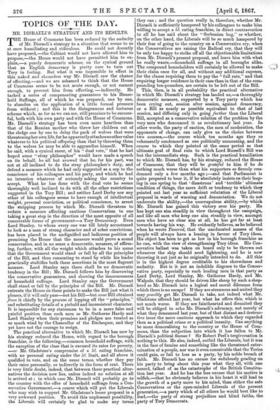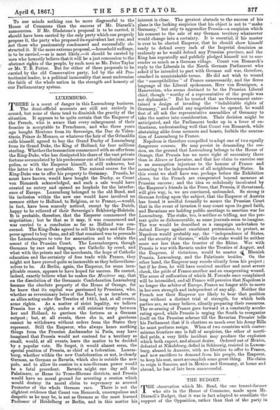TOPICS OF THE DAY.
MR. DISRAELI'S STRATEGY AND ITS BERM TS. - This, then, is in all probability the practical alternative in which Mr. Disraeli's strategy has landed us,—a thoroughly democratic measure, supported by a Tory party which has been crying out, session after session, against democracy, or a Bill as nearly as possible equivalent to that of last session, and differing only in going further than the Liberal Bill, accepted as a conservative solution of the problem by the very men who denounced it as revolutionary last year. In other words, the party of caution, the men of moderation, the opponents of change, can only give us the choice between two courses,—the course which ten months ago they so vehemently condemned as one politically unmeaning, and the course to which they pointed at the same period as that ultimate goal of final ruin to which Lord Russell's Bill was but the intermediate step. Such is the practical humiliation to which Mr. Disraeli has, by his strategy, reduced the House of Commons, that they will be grateful to him if he do nothing much worse than what his supporters so fiercely con- demned only a few months ago ;—and that Parliament is quite prepared to bear it, if he absolutely insists on their leap- ing in one spring to that 'disastrous' and 'terrible' ultimate condition of things, the mere drift or tendency to which they pointed out last year as sufficient refutation of the Liberal proposal in words of warning and denunciation. We do not underrate the ability,—the unscrupulous ability,—by which Mr. Disraeli has gained this victory over his party. He has kept one aim steadily in view throughout the campaign, and like all men who keep one aim steadily in view, amongst men who have no clear aim at all, he has got far at least towards having his way. He evidently believes, as he believed when he wrote Tancred, that the uneducated masses of the people will always have a leaning in favour of Tory ideas. His object has been to get as low in his borough franchise as he can, with the view of strengthening Tory ideas. His Con- servative ballast was taken on board only to be thrown out whenever the ship should need lightening, and he is now throwing it out just as he originally intended to do. All this is in the highest degree creditable to his shrewdness and audacity. But is it not an indelible disgrace to the Conser- vative party, especially to such leading men in that party as Lord Derby, Lord Stanley, Mr. Gathorne Hardy, and Mr. Walpole, that they should be driven like sheep by such a shep- herd as Mr. Disraeli into a logical and moral dilemma from which there is no escape? If they are strenuous and united they may possibly get Mr. Disraeli to take, not indeed what. Mr. Gladstone offered last year, but what he offers this, which is not much worse. If they are fainthearted and disunited they will be obliged to echo Mr. Disraeli's advocacy, not merely of what they denounced last year, but of that distant and destruc- tive issue the mere cautious approach to which they regarded then as a political crime or a political insanity. Can anything be more demoralizing to the country or the House of Com- mons, than the subjection into which it has fallen to Mr. Disraeli's political finesse ? Sir Robert Peel's tergiversation is nothing to this. He also, indeed, outbid the Liberals, but it was in the face of famine and something like the threatened exter- mination of a people, nor was it even conceivable that the Tories could gain, or fail to lose as a party, by his noble breach of faith. Mr. Disraeli has no excuse for sedulously goading on his party to bring about this year what they all, with one accord, talked of as the catastrophe of the British Constitu- tion last year. And he has the less excuse that his motive is selfish,—that he obviously believes in his heart it will lead to the growth of a party more to his mind, than either the safe Conservatives or the open-minded Liberals of the present generation,—a party which of all others he would best like to lead,—the party of strong prejudices and blind faiths, the the Liberals will certainly be glad to make any terms party of Tory Democrats. THE House of Commons has been reduced by the audacity of Mr. Disraeli's strategy to a situation that seems to us at once humiliating and ridiculous. He could not decently have proposed,—the Cabinet would not have allowed him to propose,—the House would not have permitted him to ex- plain,—a purely democratic scheme, on the cynical ground that an English democracy is pretty sure to turn out Tory in feeling. But what it was impossible to effect in this naked and shameless way Mr. Disraeli saw the chance of effecting,—and we are ashamed to think that the House of Commons seems to be not acute enough, or not earnest enough, to prevent him from effecting, — indirectly. He tacked a series of compensating guarantees to his House- hold Suffrage, all of which he was prepared, one by one, to abandon on the application of a little formal pressure from without ; and this is the disingenuous and tortuous scheme which, as far as we can see, still promises to be success- ful, both with his own party and with the House of Commons. Mr. Disraeli's strategy has been even more heartless than that of the Russian mother who threw her children out of the sledge one by one to delay the pack of wolves that were threatening her own life, for he apparently attaches no other value whatever to his political offspring than that by throwing them to the wolves he may be able to aggrandize himself. When he said, with a cynical sneer, of his "dual vote," that he had hoped some "stray philosopher" would have made a speech on its behalf, he all but avowed that he, for his part, was not at all inclined to do the stray philosopher's duty, and defend a measure which he had only suggested as a sop to the conscience of his colleagues and his party, and which he had no intention whatever of seriously asking the country to accept. What he has done with the dual vote he seems thoroughly well inclined to do with all the other restrictions suggested in the Tory Bill ; and neither Lord Derby nor any other of his colleagues seems to have enough of intellectual weight, personal conviction, or political conscience, to arrest the .stripping process by which Mr. Disraeli threatens to reduce a measure affecting cautious Conservatism to one taking a great step in the direction of the most opposite of all conceivable forms of government—a Tory Democracy. Even Lord Stanley, to whom every one was till lately accustomed to look as a man of strong character and of sober convictions, has been placed in the undignified and ludicrous position of promising the House that the measure would prove a sound conservative, and in no sense a democratic, measure, of affirm- ing, further, with all the weight which attaches to his name that the Government would stand or fall by all the principles of the Bill, and then consenting to stand by while his leader practically stultifies both these assertions in the most flagrant manner. Lord Stanley says there shall be no democratic tendency in the Bill ; Mr. Disraeli follows him by disavowing the conservative guarantees, and showing the innocuousness of household suffrage. Lord Stanley says the Government shall stand or fall by the principles of the Bill. Mr. Disraeli entreats the House on these points to make the Bill just what it pleases, if it will only pass—not his Bill—but some Bill obtained from it chiefly by the process of lopping off the "principles," and substituting details of a piebald and inconsistent character. It is impossible for any statesman to be in a more false and painful position than such men as Mr. Gathorne Hardy and Lord Stanley when their promises and pledges are treated as so much wind by the Chancellor of the Exchequer, and they yet have not the courage to resign.
• The practical alternative to which Mr. Disraeli has now by his strategy reduced the House, with regard to the borough franchise, is the following,---common household suffrage, with the exception of the class that is excused its rates for poverty, —or Mr. Gladstone's compromise of a 5l. rating franchise, with no personal rating under the Si. limit, and all above it qualified to vote, and on the same terms, whether they pay their rates personally, or indirectly in the form of rent. There is very little doubt, indeed, that between these practical alter- natives the decision now lies, unless indeed no solution at all is arrived at ; in which case Mr. Disraeli will probably go to the country with the offer of household suffrage from a Con- servative Government,—a course which will put the Liberals who may wish to support Mr. Gladstone's lesser proposal in a very awkward position. To avoid this unpleasant possibility, they can ; and the question really is, therefore, whether Mr. Disraeli is sufficiently hampered by his colleagues to make him willing to accept a 5/. rating franchise, in direct contravention to all he has said about the " Serbonian bog," or whether, on the other hand, the Liberals will be so much hampered by their fear of going to the country on a Conservative cry, when the Conservatives are raising the Radical cry, that they will be only too happy to strike off all the objectionable limitations from Mr. Disraeli's present proposal, and leave him with what he really wants,—household suffrage in all boroughs alike. The compound householders will certainly be allowed to make their claim once for all, and without any additional expense, for the clause requiring them to pay the "full rate," and that requiring longer residence in their case than in that of the com- pounding ten-pounders, are certain to be left out of the Bill. To our minds nothing can be more disgraceful to the House of Commons than the success of Mr. Disraeli's manceuvres. If Mr. Gladstone's proposal is to be carried, it should have been carried by the only party which can properly propose it, the party who proposed its equivalent last year, and mot those who passionately condemned and successfully ob- ntructed it. If the more extreme proposal,—household suffrage, is to be carried,—as is most likely,—it should be carried by men who honestly believe that it will be a just concession to the abstract rights of the people, by such men as Mr. Peter Taylor 'or Mr. T. B. Potter. But for either of these proposals to be carried by the old Conservative party, led by the old Pro- tectionist leader, is a political immorality that must undermine the faith of the whole nation in the strength and honesty of cur Parliamentary system.































 Previous page
Previous page